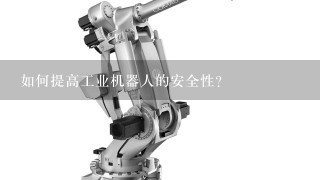如何提高工业机器人的安全性?

Answer:
1. Design for Safety:
- Incorporate safety features into the machine design, such as emergency stop buttons, overload protection, and fail-safe mechanisms.
- Use materials that are resistant to corrosion and other corrosive substances.
- Design the machine to be easily accessible for maintenance and inspection.
2. Implement Safe Operating Practices:
- Provide clear and concise instructions for safe operation, including proper use of personal protective equipment (PPE) and emergency procedures.
- Conduct thorough training for all personnel involved in operating the machine.
- Establish safe work practices, such as avoiding loose clothing or hair around moving parts.
3. Use Safe Sensors and Feedback Mechanisms:
- Install safety sensors to detect potential hazards, such as loose objects, overspeed, or machine failure.
- Provide visual and audible alarms to alert personnel to unsafe conditions.
- Use feedback mechanisms to provide information about the machine's status and potential risks.
4. Implement Safe Communication Systems:
- Establish clear communication channels between the machine, control room, and personnel.
- Use safety protocols, such as lockout/tagout procedures, to ensure that only authorized personnel can access the machine.
- Provide emergency communication devices, such as fire alarms and emergency beacons.
5. Conduct Regular Inspections and Maintenance:
- Regularly inspect the machine for any signs of damage, wear, or malfunction.
- Perform preventive maintenance to identify and address potential issues before they become accidents.
- Conduct safety audits and reviews to identify and implement improvements.
6. Educate and Train Personnel:
- Provide comprehensive training on the safe operation and maintenance of the machine.
- Emphasize the importance of following safety procedures and reporting any unsafe conditions.
- Encourage a culture of safety within the workforce.
7. Implement Automation and Robotics Safety Features:
- Utilize automation and robotics safety features to minimize human exposure to hazardous areas or tasks.
- Implement safety protocols for remote operation and maintenance.
- Use sensors and feedback mechanisms to detect and prevent potential hazards.





































































